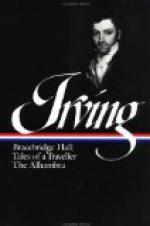[Illustration: Asleep When He Reads]
[Illustration: Falconry in Olden Times]
Falconry.
Ne is there hawk which mantleth
on her perch,
Whether high tow’ring
or accousting low,
But I the measure of her flight
doe search,
And all her prey
and all her diet know.
Spenser.
There are several grand sources of lamentation furnished to the worthy squire, by the improvement of society, and the grievous advancement of knowledge; among which there is none, I believe, that causes him more frequent regret than the unfortunate invention of gunpowder. To this he continually traces the decay of some favourite custom, and, indeed, the general downfall of all chivalrous and romantic usages. “English soldiers,” he says, “have never been the men they were in the days of the cross-bow and the long-bow; when they depended upon the strength of the arm, and the English archer could draw a cloth-yard shaft to the head. These were the times when, at the battles of Cressy, Poictiers, and Agincourt, the French chivalry was completely destroyed by the bowmen of England. The yeomanry, too, have never been what they were, when, in times of peace, they were constantly exercised with the bow, and archery was a favourite holiday pastime.”
Among the other evils which have followed in the train of this fatal invention of gunpowder, the squire classes the total decline of the noble art of falconry. “Shooting,” he says, “is a skulking, treacherous, solitary sport in comparison; but hawking was a gallant, open, sunshiny recreation; it was the generous sport of hunting carried into the skies.”
“It was, moreover,” he says, “according to Braithewaite, the stately amusement of high and mounting spirits; for, as the old Welsh proverb affirms, in those times ’You might know a gentleman by his hawk, horse, and greyhound.’ Indeed, a cavalier was seldom seen abroad without his hawk on his fist; and even a lady of rank did not think herself completely equipped, in riding forth, unless she had her tassel-gentel held by jesses on her delicate hand. It was thought in those excellent days, according to an old writer, ’quite sufficient for noblemen to winde their horn, and to carry their hawke fair; and leave study and learning to the children of mean people.’”
Knowing the good squire’s hobby, therefore, I have not been surprised at finding that, among the various recreations of former times which he has endeavoured to revive in the little world in which he rules, he has bestowed great attention on the noble art of falconry. In this he of course has been seconded by his indefatigable coadjutor, Master Simon: and even the parson has thrown considerable light on their labours, by various hints on the subject, which he has met with in old English works. As to the precious work of that famous dame, Julianna Barnes; the Gentleman’s Academie, by Markham; and the other well-known treatises that were the manuals of ancient sportsmen, they have them at their fingers’ ends: but they have more especially studied some old tapestry in the house, whereon is represented a party of cavaliers and stately dames, with doublets, caps, and flaunting feathers, mounted on horse, with attendants on foot, all in animated pursuit of the game.




